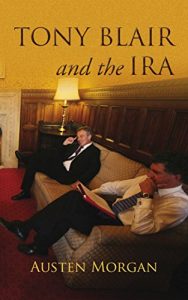Tony Blair’s historical reputation as prime minister (1997-2007) is being shaped decisively by the recent Chilcot report on Iraq. However, the leader of new labour still clings to his legacy as a peace maker in Northern Ireland.
Austen Morgan’s new book – written after the collapse of the John Downey Old Bailey trial in February 2014 – asks: how did Tony Blair implement the Belfast agreement after 1998? The answer (avoided by Chilcot as regards the Iraq war) is: the prime minister, and his chief of staff, Jonathan Powell, acted unlawfully in agreeing privately with Gerry Adams and Martin McGuinness that IRA members should benefit from effectively a secret amnesty.
Using official papers disclosed to the court, ‘Tony Blair and the IRA’ tells the story of how, on the basis of Mo Mowlam’s dealings with republican and loyalist terrorists, the provision for early release of paramilitary prisoners after two years was extended secretly to the ‘on the runs’: 228 unconvicted IRA members applied; at least 187 men and women benefited from the so-called administrative scheme, between 2000 and 2014, before it was closed down amid considerable political embarrassment.
Dealing with the Downey mistake – when an Irish republican wanted for the 1982 Hyde Park bombing was sent a comfort letter – the book exonerates two high-ranking Northern Ireland police officers, Peter Sheridan and Norman Baxter, who have hitherto been blamed, and directs responsibility to a senior Whitehall official, Mark Sweeney.
Some may try to justify what some ministers and officials did over a considerable period of time. They will be thwarted, it is believed, by the evidence revealed for the first time in this book.
Austen Morgan’s new book – written after the collapse of the John Downey Old Bailey trial in February 2014 – asks: how did Tony Blair implement the Belfast agreement after 1998? The answer (avoided by Chilcot as regards the Iraq war) is: the prime minister, and his chief of staff, Jonathan Powell, acted unlawfully in agreeing privately with Gerry Adams and Martin McGuinness that IRA members should benefit from effectively a secret amnesty.
Using official papers disclosed to the court, ‘Tony Blair and the IRA’ tells the story of how, on the basis of Mo Mowlam’s dealings with republican and loyalist terrorists, the provision for early release of paramilitary prisoners after two years was extended secretly to the ‘on the runs’: 228 unconvicted IRA members applied; at least 187 men and women benefited from the so-called administrative scheme, between 2000 and 2014, before it was closed down amid considerable political embarrassment.
Dealing with the Downey mistake – when an Irish republican wanted for the 1982 Hyde Park bombing was sent a comfort letter – the book exonerates two high-ranking Northern Ireland police officers, Peter Sheridan and Norman Baxter, who have hitherto been blamed, and directs responsibility to a senior Whitehall official, Mark Sweeney.
Some may try to justify what some ministers and officials did over a considerable period of time. They will be thwarted, it is believed, by the evidence revealed for the first time in this book.












